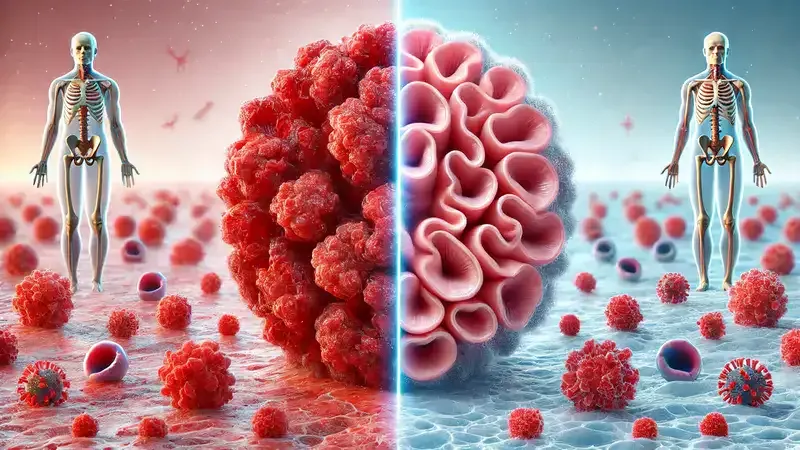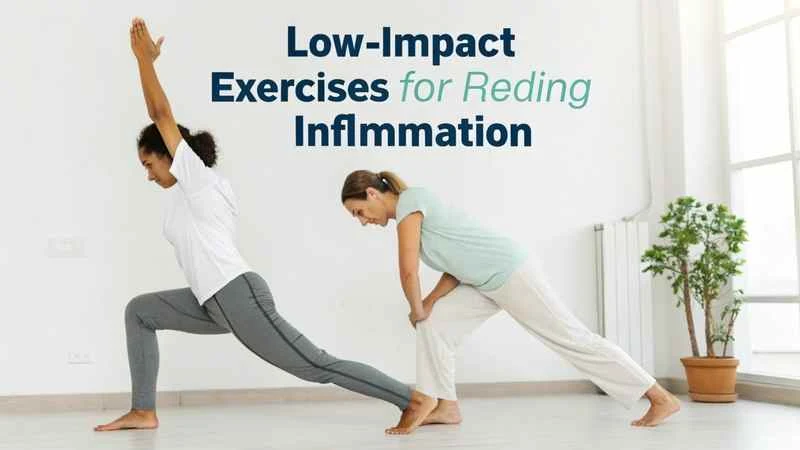[Medical Disclaimer: This article is for informational purposes only and should not be considered medical advice. Always consult with a healthcare professional before making any changes to your diet, lifestyle, or supplement regimen.]
Introduction
Inflammation is your body's natural response to injury and infection, but when it becomes chronic, it can lead to serious health concerns. Millions of people worldwide struggle with chronic inflammation, which has been linked to various conditions including heart disease, diabetes, and arthritis. The good news is that there are numerous natural ways to reduce inflammation and support your body's healing processes.
In this comprehensive guide, you'll discover evidence-based strategies to combat inflammation through diet, lifestyle changes, and natural remedies. Whether you're dealing with occasional inflammatory responses or chronic conditions, these approaches can help you take control of your health naturally.
National Institutes of Health - Understanding Inflammation
Understanding Inflammation
What Is Inflammation?
Inflammation is your body's protective response to harmful stimuli, injuries, or infections. Think of it as your immune system's first line of defense – a complex biological response that helps heal damaged tissues and fight off dangerous pathogens.
Harvard Health - What is Inflammation?
Types of Inflammation
1. Acute Inflammation
- Occurs immediately after injury or infection
- Usually lasts a few days to weeks
- Characterized by redness, swelling, heat, and pain
- A normal and necessary healing process
2. Chronic Inflammation
- Persists for months or years
- Often silent and systemic
- Can contribute to various diseases
- May be triggered by lifestyle factors
Understanding Acute vs Chronic Inflammation
Common Causes of Chronic Inflammation
- Poor dietary choicesLack of physical activity
- Chronic stress
- Environmental toxins
- Sleep deprivation
- Autoimmune conditions
- Obesity
- Smoking
Dietary Changes to Combat Inflammation
Anti-inflammatory Foods
The foods you eat can significantly impact inflammation levels in your body. Building your diet around these anti-inflammatory powerhouses can make a substantial difference:
1. Leafy Greens and Colorful Vegetables
- Spinach
- Kale
- Swiss chard
- Bell peppers
- Broccoli Rich in antioxidants and polyphenols that fight inflammation
2. Fatty Fish
- Salmon
- Mackerel
- Sardines
- Anchovies High in omega-3 fatty acids, particularly EPA and DHA American Heart Association - Fish and Omega-3 Fatty Acids
3. Berries and Antioxidant-rich Fruits
- Blueberries
- Strawberries
- Blackberries
- Cherries Packed with anti-inflammatory compounds called anthocyanins
Top 20 Anti-inflammatory Foods to Add to Your Diet
Anti-inflammatory Foods and Their Key Benefits
| Food | Key Benefits |
|---|---|
| Turmeric | Contains curcumin, which reduces inflammation and oxidative stress. |
| Ginger | Has gingerol, an anti-inflammatory compound that helps with pain relief. |
| Berries | Rich in antioxidants (anthocyanins) that fight inflammation and support immunity. |
| Fatty Fish | High in omega-3 fatty acids (EPA, DHA) that reduce chronic inflammation. |
| Leafy Greens | Contain vitamins, polyphenols, and fiber that combat inflammation. |
| Nuts (Almonds, Walnuts) | Provide healthy fats and vitamin E, which help lower inflammation. |
| Olive Oil | Extra virgin olive oil is rich in polyphenols and healthy fats that fight inflammation. |
| Garlic | Has sulfur compounds that enhance immune response and reduce inflammation. |
| Green Tea | Contains EGCG, a potent antioxidant that lowers inflammatory markers. |
| Tomatoes | Rich in lycopene, which reduces inflammation and supports heart health. |
Foods to Avoid
Just as important as knowing what to eat is understanding which foods can promote inflammation:
1. Processed Foods
- Packaged snacks
- Fast food
- Processed meats High in inflammatory compounds and artificial additives
2. Refined SugarsSodas
- Sodas
- Candy
- Baked goods
- Added sugars in processed foods Trigger inflammatory responses and
- insulin resistance
3. Trans Fats
- Margarine
- Some processed baked goods
- Deep-fried foods Promote systemic inflammation
Lifestyle Modifications for Reducing Inflammation
Exercise and Movement
Regular physical activity is one of the most effective ways to reduce chronic inflammation. Here's how to incorporate movement into your anti-inflammatory lifestyle:
1. Best Types of Exercise
- Low-impact aerobic activities
- Swimming
- Walking
- Yoga
- Tai Chi
2. Recommended Protocol
- Aim for 150 minutes of moderate exercise per week
- Include 2-3 strength training sessions
- Focus on consistency over intensity
- Listen to your body and adjust accordingly
CDC - Physical Activity Guidelines
Stress Management
Chronic stress can significantly increase inflammation in the body. Implementing these stress-reduction techniques can help:
1. Meditation and Mindfulness
- Daily meditation practice (10-20 minutes) Mindful breathing exercises
- Body scan meditation
- Nature walks
2. Sleep Optimization
- Maintain consistent sleep schedule
- Create a relaxing bedtime routine
- Aim for 7-9 hours of quality sleep
- Keep bedroom cool and dark
The Connection Between Stress and Inflammation
Natural Supplements and Remedies
Evidence-based Supplements
When choosing supplements for inflammation reduction, focus on these research-backed options:
1. Omega-3 Fatty Acids
- Dosage: 1,000-2,000 mg daily
- Look for high-quality fish oil or algae-based supplements
- Check EPA/DHA ratio
2. Turmeric/Curcumin
- Dosage: 500-2,000 mg daily
- Choose supplements with black pepper extract
- Take with meals for better absorption
National Center for Complementary and Integrative Health - Turmeric
| Supplement | Recommended Dosage | Key Considerations | Best Timing |
|---|---|---|---|
| Omega-3 Fatty Acids | 1,000–2,000 mg daily | Choose high-quality fish oil or algae-based supplements; check EPA/DHA ratio. | With meals (preferably with fat) |
| Turmeric/Curcumin | 500–2,000 mg daily | Look for supplements with black pepper extract for better absorption. | With meals for improved bioavailability |
Frequently Asked Questions About Reducing Inflammation
How long does it take to reduce inflammation naturally?
The timeline for reducing inflammation naturally varies depending on the type and severity. Acute inflammation may resolve within a few days to weeks. For chronic inflammation, you may notice initial improvements within 2-4 weeks of following anti- inflammatory diet and lifestyle changes, but significant results typically take 3-6 months of consistent effort.What are the most effective natural anti-inflammatory supplements?
The most research-backed natural anti-inflammatory supplements include omega-3 fatty acids (1,000-2,000mg daily), turmeric with black pepper extract (500-2,000mg daily), ginger, and green tea extract. Always consult with a healthcare provider before starting any supplement regimen, as individual needs and interactions may vary.Can diet alone reduce inflammation in the body?
Yes, diet can significantly reduce inflammation, but it's most effective as part of a comprehensive approach. An anti-inflammatory diet rich in fruits, vegetables, fatty fish, and whole grains, while limiting processed foods and refined sugars, can lead to substantial improvements. However, combining dietary changes with exercise, stress management, and adequate sleep yields optimal results.What are the signs that inflammation is reducing in your body?
Common signs that inflammation is decreasing include reduced joint pain and stiffness, improved energy levels, better digestion, clearer skin, reduced swelling, improved sleep quality, and enhanced mental clarity. However, some benefits may not be immediately noticeable as internal inflammation reduces gradually.Is exercise good or bad for inflammation?
Moderate exercise is beneficial for reducing inflammation, while excessive or intense exercise may temporarily increase it. Aim for 150 minutes of moderate activity weekly, including low-impact exercises like walking, swimming, or yoga. Listen to your body and adjust intensity based on your condition and energy levels.
Conclusion
Reducing inflammation naturally requires a multi-faceted approach combining proper nutrition, regular exercise, stress management, and targeted supplementation. While the journey to reducing inflammation takes time and dedication, the benefits to your overall health and well-being are substantial.
Remember to:
- Focus on anti-inflammatory foods Stay physically activeManage stress effectively
- Get adequate sleep
- Consider appropriate supplements
Most importantly, be patient with your body and consistent with your chosen approaches. If you're dealing with severe inflammation or specific health conditions, always work with healthcare professionals to develop the most appropriate plan for your situation.
[Final Medical Disclaimer: The information provided in this article is not intended to diagnose, treat, cure, or prevent any disease. Always consult with qualified healthcare professionals before starting any new diet, exercise program, or supplements.]





